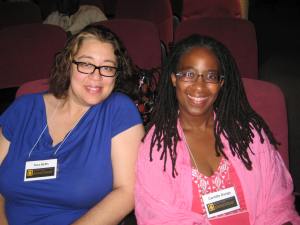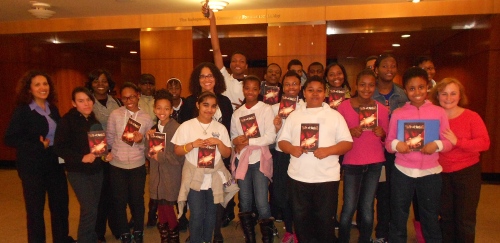 I’m here—in a pretty little bungalow that’s a virtual replica of the one I stayed in last year! I set my alarm for 5am but woke at 3 this morning; felt a headache coming on so got up and got ready to head to the airport. My driver was a lovely man from Guinea and we made it ALMOST the whole way to the airport before he asked—as all taxi drivers in NYC do–“Are you married or single?” We discussed the political crisis in Egypt, the violence in Syria, the instability in neighboring Mali (which he fears will spread to Guinea). We talked about the importance of education and the high cost of travel between countries in West Africa and the Caribbean. But just as the airport came into view, he asked about my marital status.
I’m here—in a pretty little bungalow that’s a virtual replica of the one I stayed in last year! I set my alarm for 5am but woke at 3 this morning; felt a headache coming on so got up and got ready to head to the airport. My driver was a lovely man from Guinea and we made it ALMOST the whole way to the airport before he asked—as all taxi drivers in NYC do–“Are you married or single?” We discussed the political crisis in Egypt, the violence in Syria, the instability in neighboring Mali (which he fears will spread to Guinea). We talked about the importance of education and the high cost of travel between countries in West Africa and the Caribbean. But just as the airport came into view, he asked about my marital status.
HIM: Are you married or single?
ME: Single.
HIM: It’s better to be married.
ME: Maybe for men it’s better. I’m not so sure it’s better for women. Not for me, anyway.
HIM: You just have to choose the right person. Women today want to be independent but they choose the wrong person. God will choose the right person for you.
I didn’t bother to respond to that. Still, we parted on good terms and I gave him a nice tip because I thought of my students when he revealed that he could barely write his own name when he arrived in the US fifteen years ago. “Education is everything.” It certainly is. I hauled my book-filled bag into the terminal and onto the scale—I had my wallet open because I knew there would be a surcharge for the extra weight. But the attendant just put the sticker on my suitcase and told me to drop it on the conveyor belt. Security was a breeze…it was amazing. We landed on time and since I was seated at the back of the plane, I was one of the first people to exit via the rear stairway. I was the FIRST person to clear customs, I got my bags, and had plenty of time to spare before the 1pm ferry left St. Kitts for Nevis. The sea was choppy, perhaps as residual effect of Hurricane Chantal, but I just closed my eyes and focused on my breathing. Somehow lurching back and forth doesn’t affect me if I can’t actually see the boat bobbing up and down. When i got off the ferry, Marva Roberts from the Nevis Library Service was there to meet me and she and her daughter drove me to my hotel—all the while filling me in on the many exciting literacy events they’ve held in the past year. I don’t know what it is about librarians, but they’re just awesome. I think it’s that they love books and want others to love books, too. Later this week I’ll meet with the librarians at Charlestown Secondary School to give them the forty books I brought from New York. I actually broke my suitcase hauling those books off the ferry but now that they’re here in my room, they seem rather inadequate. I wish I had 100 books to give…
 My 3am headache has hung around all day but I’m hoping a good meal and a good night’s rest will clear it up. I flopped on the lovely four-poster bed this afternoon and got annoyed when a bird started chirping RIGHT outside my window. This little bungalow has 5 windows, including one right behind the bed and I swear that bird was deliberately sitting on the window ledge so she couldn’t be ignored. I finally dragged myself up and put my glasses back on only to find…a hummingbird! It wasn’t doing all the chirping, it was too busy feeding from the flowering tree outside my window. I watched it for almost a minute before it flew away. So thank you, little squeaky bird, for annoying me enough to draw my attention to the very bird that has led me on this journey.(It was a Green-Throated Carib, I think)
My 3am headache has hung around all day but I’m hoping a good meal and a good night’s rest will clear it up. I flopped on the lovely four-poster bed this afternoon and got annoyed when a bird started chirping RIGHT outside my window. This little bungalow has 5 windows, including one right behind the bed and I swear that bird was deliberately sitting on the window ledge so she couldn’t be ignored. I finally dragged myself up and put my glasses back on only to find…a hummingbird! It wasn’t doing all the chirping, it was too busy feeding from the flowering tree outside my window. I watched it for almost a minute before it flew away. So thank you, little squeaky bird, for annoying me enough to draw my attention to the very bird that has led me on this journey.(It was a Green-Throated Carib, I think)
On the plane I sat next to a young woman who looked very familiar. She offered me a piece of gum as the plane took off, and then draped a blanket over her head and slept the rest of the way. We chatted a little at the airport and it turns out she’s a student at Hunter College! I gave her my card when we got off the ferry (she gave me a hug!) and asked her to email me so I could possibly interview her for the book. I’m going to interview my cousin tonight after dinner (if we can stay awake). And my aunt is making me soup for lunch tomorrow, which I desperately need since neither my inhaler nor the cough syrup I’m taking seems to have much effect…
I’m here–can’t say “I’m home,” but I did feel something like pride when the ferry pulled up and I could see Nevis Peak stretching up into the clouds. Plus the man who sat next to me on the ferry had a chuckle just like my Dad’s! I’ve never heard *anyone* laugh that way. It must be a Nevis thing…





 3:15PM
3:15PM 4:30PM
4:30PM 5:40PM
5:40PM 3:15PM
3:15PM 4:30PM
4:30PM 5:40PM
5:40PM 7:00PM
7:00PM













